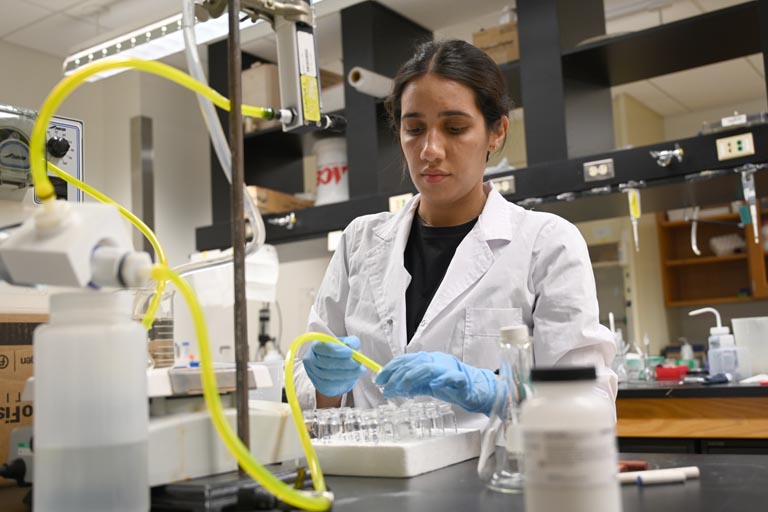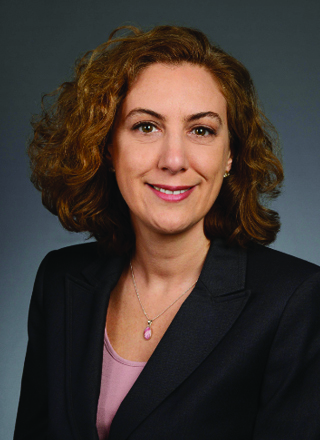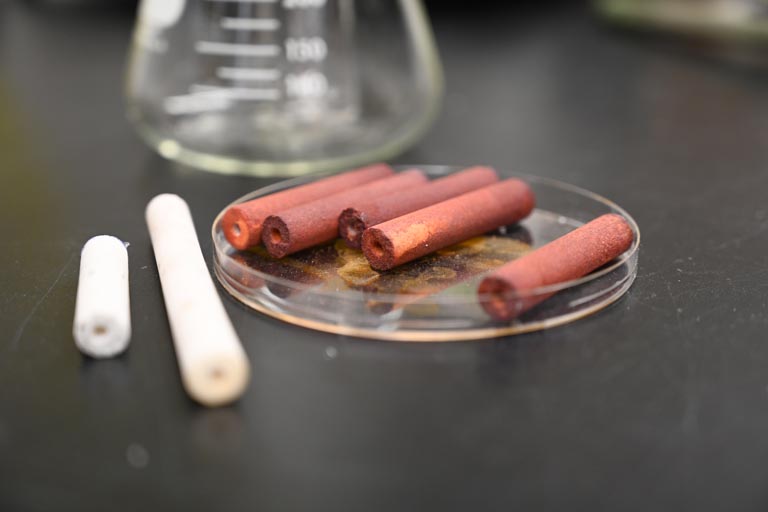October 28, 2024
Mizzou Engineers secured an EPA grant to pursue an innovative method to remove PFAS from water and degrade the chemicals.


Researchers at Mizzou Engineering have secured a significant grant as part of the EPA’s 18th Annual P3 Phase II awards, to develop a modular, stand-alone water treatment unit. The project, led by Maria Fidalgo, associate professor in civil and environmental engineering, focuses on addressing the pressing issue of PFAS (Per- and Polyfluoroalkyl Substances) contamination in drinking water.
Fidalgo and her team are developing an innovative filtration system designed to separate and degrade PFAS using an affordable, scalable solution. The hybrid filter consists of an iron oxide-coated ceramic membrane that not only removes contaminants but also catalyzes chemical reactions to degrade the PFAS compounds.
“What we’re trying to do is put these processes together and come up with a material that can separate by size and, at the same time, degrade PFAS,” Fidalgo said. “It’s simple, fairly low-cost, and adaptable for use in drinking water treatment plants.”
A hybrid approach to adsorption filtration
PFAS, often referred to as “forever chemicals,” are a group of synthetic compounds that are resistant to environmental degradation, making them persistent contaminants in water sources. Traditional water treatment methods struggle to remove PFAS effectively and the need for advanced solutions is critical.
“There are sites with very high concentrations of PFAS, such as military bases or places where firefighting foam has been used,” Fidalgo said. “And then there are others with lower levels, such as rivers or reservoirs. Both present distinct challenges that require innovative technologies like ours.”
The Mizzou project is noteworthy not only for its technological innovation but also for its emphasis on environmental sustainability. The system operates at low pressure, using UV light from LEDs, which minimizes energy consumption. The use of widely available, environmentally benign materials ensures that the unit remains cost-effective and accessible for rural and underserved communities.
Graduate student Gema Diaz Bukvic, who is pursuing her Ph.D. in water treatment with a focus on adsorption filtration methods under Fidalgo, emphasized the project’s dual goals.

“We aim to capture and degrade PFAS, unlike traditional adsorption methods that only capture the contaminant,” she said. “Understanding the interactions between PFAS and our membrane system is key to creating a technology that not only works for PFAS but could be extended to other pollutants in the future.”
Diaz Bukvic explained that their process involves many steps, adding in layers of contaminants to clean water until their samples resemble the conditions of real water samples. At each step along the way, the team is testing the effectiveness of the hybrid filter to see if any other contaminants compete with the PFAS being targeted.
Interdisciplinary research leading the charge
The team is collaborating with other experts, including Chung Ho Lin, a research professor in the College of Agriculture, Food and Natural Resources, who provides expertise in measuring contaminants at low concentrations.
“Interdisciplinary collaboration is essential for building comprehensive solutions,” Fidalgo said. “We have the materials expertise, and with Lin’s analytical support, we can produce robust, effective data.”
These efforts highlight the university’s significant and expanding leadership in addressing PFAS contamination in Missouri and beyond. By developing cutting-edge technology that tackles these persistent pollutants, Mizzou Engineering further cements its role as the leader in the state for PFAS research, driving both environmental and public health advancements.
“This work is really exciting because PFAS is a hot topic in the research community and there are a lot of people working on it,” Fidalgo said. “When that happens, you feel like you’re part of this community working toward a common goal to solve this big problem. And when something is so current, so pressing, it is very motivating to work on it.
“There are a lot of unknowns with this work, and that provides an extra challenge,” she said. “Sometimes we look at what the properties may be and sometimes we don’t know how they will react. So, we’re really discovering things that are brand new. It makes this work extra interesting.”
Develop technologies using new and innovative approaches to improve water treatment processes. Choose Mizzou Engineering!